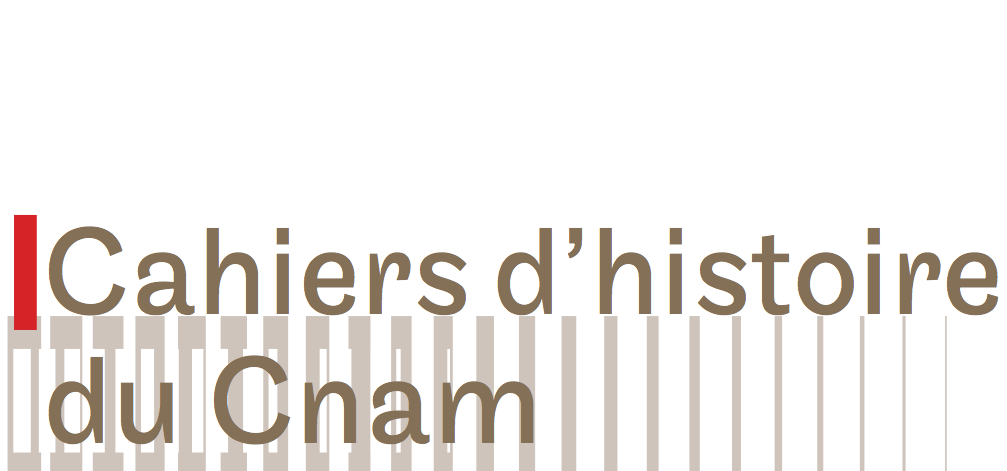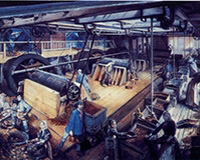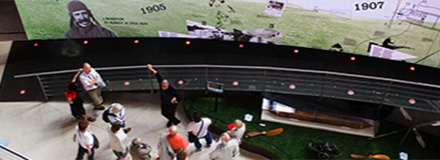“Engineers who read accounts”. Technical and managerial knowledge from the standpoint of cost accounting (1850-1950)

3 avril 201715 octobre 2017
Check the webpage for the scholar journal Cahiers d'histoire du Cnam and access past volumes (in French).
Please send a one-page abstract to the special issue editors (marco.bertilorenzi@unipd.it; ferruccio.ricciardi@cnam.fr) by October 15, 2017.
Schedule
Authors will be notified by the end of October, 2017.
The full article is expected by December 15, 2017: we welcome both short articles (4000 to 7000 words) and long articles (7000 to 11 000 words).
The volume will be published by the end of 2018.
Call for papers for a special issue of Cahiers d’Histoire du Cnam
edited by Marco Bertilorenzi (DISSGEA, University of Padua) and Ferruccio Ricciardi (CNRS, Lise-Cnam)
Rationale
Since the second half of the 19th century, engineers’ tasks have been progressively re-oriented to help the rationalisation of supplies, of flows and of human capital. This transition from a mere technical level role to another in which managerial capabilities were included happened in the midst of a broad transformation of the industrial economy and, more specifically, in sectors such as the mining and steel industries. It is no coincidence that at the beginning of the 20th century, two engineers – Frederick Winslow Taylor et Henri Fayol – significantly contributed to the casting of the conceptual kernel of the new science of modern management. Workforce administration went hand in hand with the management of resources, linking the ability to administer current business with skills in forecasting and anticipating. This new management knowledge – still blurred and not yet formalised – was equipped with a range of new tools, such as for instance Gantt charts, flow charts and descriptive forms of job positions. Among these new tools, cost accounting had a special place because it served both to guide the enterprise and to manage the workforce. The organisational needs of the big enterprise included the necessity of knowing and taking control over costs by anticipation, and contributing to the definition of production and investment plans. Both in France and abroad, engineers played a central role in the managerial transformation of the enterprise. In this special issue of Cahiers d’histoire du Cnam, we aim to gather contributions concerning the relationship between engineers and cost accounting during the historical development of the major industrial enterprise model (1850-1950).
Scholarship has already shown that we can challenge Sidney Pollard’s pessimistic vision which argued that the prodromal activities of ‘management accounting’ could only be found at the beginning of the 20th century, the point at which the principles of scientific management began to be diffused. In fact, the first forms of cost control accounting emerged before the mid-19th century in the UK, France and other industrialised countries. Analysis of accountancy practices that were developed in specific industries, such as mines and steel mills, provide earlier evidence. In the following decades, specialised treaties and handbooks contain the first kernel of theoretical reflection on the practice. Certain authors, such as the French Adolphe Guibault and Eugène Léauthey or the British Emile Garke and Jen M. Fells, for instance, became classic reference points for the discipline. Their works (and their respective translations) circulated among the milieux of engineers and production supervisors. The latter captured the techniques of costs analysis because of their double organisation and technical functions. To seize ‘how much it costs’ is related to the capacity to evaluate the contribution of each productive unit (in today’s term, the ‘cost centres’) and led to greater available control over the workforce. In the new “corporate economy” which coalesced at the turn of the 19th - 20th centuries, when big business emerged with vertically and horizontally integrated firms, engineers progressively started to overcome a simple technical task. They integrated design offices and production-planning departments, specialised in cost calculation, and focused their attention on the economic dimension of costs, for example concentrating on a correct balance between maintenance costs and machinery values.
Some elements of potential conflict emerged between accountants and engineers: the monopoly over cost control was the nub of a ‘jurisdiction battle’, not only inside enterprises, but inside the management discipline as a whole, which was still a scientific field under constitution. The mastery of technical details entered both into the value chain and into cost control at the same time in which new technology opportunities were opened by the organisation of innovation and of R&D inside big businesses. By empowering control over production costs, engineers contributed in shaping the industrial accountancy as a key tool in the rational management of enterprises and succeeded in reconfiguring their role in industrial organisation. This phenomenon, which is only apparently marginal, raises many questions to which scholarship from business history and technology history have only partially replied. This special issue aims to address this gap thanks to both empirical research and reviews of literature in the accounting and management history field.
We would like to focus on contributions that respond to these questions (not exhaustive):
- How did the technical rationality of engineers fuel and craft the economic rationality of managers?
- What is the place of cost accounting in engineers’ training? From when and where (in which faculties for postgraduate education) has cost accounting been taught?
- What is the specific role of education, in particular, of Conservatoire national des arts et metiers (CNAM) in the genesis and further legitimation of the accountancy knowledge of engineers?
- How have national accountancy traditions interacted with the techniques of cost analysis? Is any international comparison possible?
- What are the effects of the circulation and hybridisation of this knowledge amongst territories, industrial branches and fields?
- How has the process of technical innovation contributed to the empowerment of cost accounting? What is the process of legitimation behind this?
- How did the techniques of cost control reshape the issues of training and organisation for an enterprise?
- How have engineers broadened their professional field in order to place their skills into the common managerial background?
Bibliography
Abbott A. (1988), The System of Profession. An Essay on the Division of Expert Labor, Chicago, University of Chicago Press.
Bensadon D., Praquin N., Touchelay B. (dir.) (2016), Dictionnaire historique de comptabilité des entreprises, Lilles, Presses universitaires de Septentrion.
Bertilorenzi M., Passaqui J.-P., Garçon A.-F. (dir.) (2016), Entre technique et gestion. Une histoire des « Ingénieurs civils des mines » (XIXe-XXe siècles), Paris, Presses des Mines.
Burlaud A., Simon C.J. (2013), Le contrôle de gestion, Paris, La Découverte.
Fleishman R.K., Tyson T.N. (1993), « Cost accounting during the industrial revolution: the present state of historical knowledge », Economic history review, vol. XLVI, n° 3, pp. 503-517.
Kaplan R.S., Johnson H.T. (1987), Relevance Lost. The Rise and Fall of Management Accounting, Boston, Harvard Business School Press.
Hopper T., Amstrong P. (1991), « Cost accounting, controlling labour and the rise of conglomerates », Accounting, Organization & Society, vol. 16, n° 5/6, pp. 405-438.
Lefebvre P. (2003), L’invention de la grande entreprise. Travail, hiérarchie, marché. France, fin XVIIIe-début XXe siècle, Paris, PUF.
Loft A. (1986), « Towards a critical understanding of accounting: the case of cost accounting in the UK, 1914-1925 », Accounting, Organization & Society, vol. 11, n° 2, pp. 137-169.
McKenna C.D. (2006), The World’s Newest Profession. Management Consulting in the Twentieth Century, Cambridge, Cambridge University Press.
Miller P., Hopper T., Lauglin R. (1991), « The new accounting history: an introduction », Accounting, Organization & Society, vol. 16, n° 5/6, pp. 395-493.
Pezet A. (2009), « The history of the French Tableau de bord (1885-1975): evidence from the archives », Accounting, Business & Financial History, vol. 19, n° 2, pp. 103-125.
Pollard S. (1965), The Genesis of Modern Management. A Study of Industrial Revolution in Great Britain, Cambridge, Harvard University Press.
Zimnovitch H. (1996), « L’émergence des coûts standard aux Etats-Unis : 1830-1930. Pourquoi ? Quel enseignement pour la France ? », Entreprise et Histoire, n° 13, pp. 27-52.

3 avril 201715 octobre 2017
Check the webpage for the scholar journal Cahiers d'histoire du Cnam and access past volumes (in French).
Please send a one-page abstract to the special issue editors (marco.bertilorenzi@unipd.it; ferruccio.ricciardi@cnam.fr) by October 15, 2017.
Schedule
Authors will be notified by the end of October, 2017.
The full article is expected by December 15, 2017: we welcome both short articles (4000 to 7000 words) and long articles (7000 to 11 000 words).
The volume will be published by the end of 2018.


